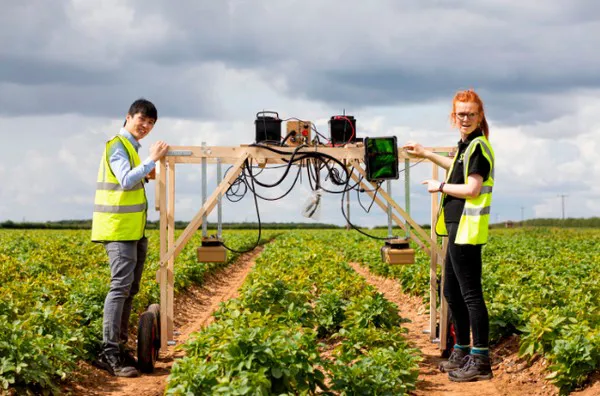As part of UK Research & Innovation’s (UKRI) Transforming Food Production (TFP) challenge, Lincoln-based B-hive Innovations Ltd and Shropshire’s Harper Adams University have been awarded £391,000 for the development of their Tuberscan project, which aims to use ground-penetrating radar to improve the level of crop knowledge and management of potato crops before they are harvested.
B-hive’s director Vidyanath (Vee) Gururajan explains that the company, which was created by the shareholders of leading fresh potato supplier Branston as a stand-alone agri-tech business, had undertaken its own small-scale proof of concept testing and applied for the TFP to progress from this initial stage to having a working prototype which can be developed and used to demonstrate the feasibility of the technology.
“The funding application process enabled us to think through how we are going to deliver Tuberscan, when we are going to deliver it, what will it cost us to delivery it, and also how to decrease and mitigate the risks,” says Vee. “The funding means that we are now able to go from proof-of-concept to a working prototype in 18 months, which will be the mark of success for us. The funding also means that we have been able to employ the right skills and also work with the right partners, such as Harper Adams and Branston – factors that are critical to the success of this project.”

“Tuberscan is a good example of a technology that could be, and is being, used to increase yield and productivity, and hopefully therefore reduce emissions,” explains Katrina Hayter, the ISCF Challenge Director for Transforming Food Production at UKRI. “They are using a lot of technology here: sensor technology as well as using data and machine learning which predicts when to harvest the crop at the optimum time.”
Katrina stresses that the TFP Challenge is not only interested in the technology itself, but in how it can be utilized across the whole supply chain: “It’s only really when you put these technologies together that you get real industry transformation, she adds. “It is really inspiring to see this project in the context of the other projects that B-hive Innovations are involved in, and how that technology is being used in a large supply chain with Branston and their customers; and how it can reduce emissions, boost productivity and decrease waste.”
Click here to read more about the Transforming Food Production Program.
For more information:
UK Research and Innovation
Tel: +44 01793 444000
Email: communications@ukri.org
www.ukri.org
